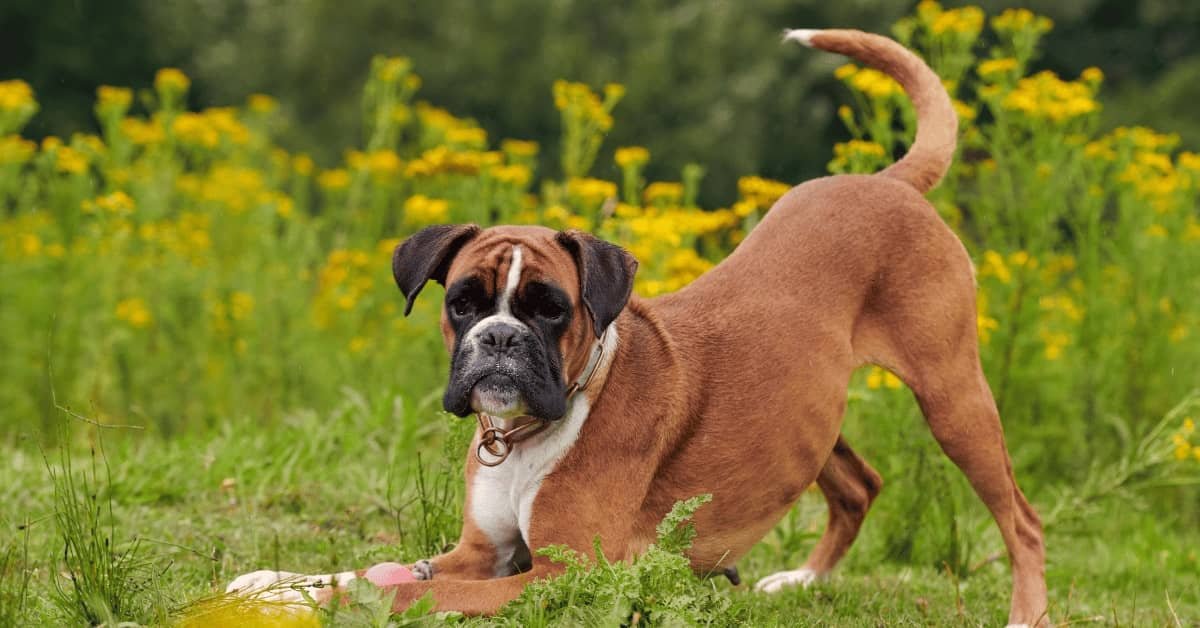Older dogs lose weight due to health issues or changes in metabolism. Common causes include dental problems, diabetes, or kidney disease. So let’s read: Why Do Older Dogs Lose Weight?
Weight loss in older dogs can be alarming for pet owners. As dogs age, their bodies undergo significant changes that may affect their health. Dental issues can make eating painful, leading to reduced food intake. Chronic conditions like diabetes or kidney disease can also contribute to weight loss.
Regular veterinary check-ups are crucial to identify and manage these health problems early. Monitoring your dog’s diet and ensuring they receive proper nutrition is essential. Understanding these factors can help you maintain your senior dog’s health and well-being.
Table of Contents
Common Reasons For Weight Loss
Older dogs often lose weight due to various reasons. Identifying the cause helps in managing their health better. Below are some common reasons for weight loss in older dogs.
Nutritional Deficiencies
Older dogs may not absorb nutrients well. This can lead to nutritional deficiencies. Their diet might lack essential vitamins and minerals. Poor nutrition can cause significant weight loss.
Consider the following when assessing nutritional health:
- Quality of dog food
- Presence of essential vitamins and minerals
- Proper hydration levels
| Nutrient | Importance |
|---|---|
| Protein | Essential for muscle maintenance |
| Calcium | Vital for bone health |
| Vitamin B | Important for energy levels |
Age-related Changes
As dogs age, their bodies undergo many changes. Metabolic rate slows down, leading to reduced appetite. Digestive efficiency can also decline.
Here are some common age-related changes:
- Decreased muscle mass
- Reduced appetite
- Slow metabolism
These changes can make it harder for older dogs to maintain weight. Regular vet check-ups can help manage these changes effectively.
Medical Conditions
Older dogs often lose weight due to various medical conditions. These health issues can significantly affect their overall well-being. Understanding these conditions can help in managing your pet’s health.
Diabetes
Diabetes is a common cause of weight loss in older dogs. This disease affects the body’s ability to process sugar. As a result, the dog’s body starts using fat and muscle for energy. This leads to weight loss even if the dog eats normally.
Here are some symptoms of diabetes in dogs:
- Increased thirst
- Frequent urination
- Increased appetite
- Weight loss
Kidney Disease
Kidney disease is another reason older dogs may lose weight. The kidneys filter waste from the blood. When they fail, toxins build up in the body. This leads to nausea, vomiting, and loss of appetite.
Common signs of kidney disease include:
- Decreased appetite
- Weight loss
- Increased thirst
- Frequent urination
Early detection and treatment can slow the progression of these diseases. Regular vet check-ups are crucial for older dogs.

Credit: https://www.deerparkvet.com
Dental Health
Older dogs often face various health issues, and dental health is a significant concern. Poor dental health can lead to weight loss in older dogs. Dental problems can make eating painful and uncomfortable. Let’s explore two common dental issues: tooth decay and gum disease.
Tooth Decay
Tooth decay is a common issue in older dogs. Plaque builds up on their teeth over time. This plaque can turn into tartar, which causes cavities. Cavities make chewing painful, and dogs may avoid eating. This leads to weight loss. Regular dental check-ups can help prevent tooth decay.
Gum Disease
Gum disease is another serious dental problem. It starts with gingivitis, which is gum inflammation. If untreated, it can progress to periodontitis. Periodontitis can cause severe pain and tooth loss. Dogs with gum disease may find it hard to chew their food. This can result in weight loss. Symptoms of gum disease include bad breath, swollen gums, and loose teeth.
- Bad breath
- Swollen gums
- Loose teeth
Maintaining good dental hygiene can prevent gum disease. Regular brushing and dental treats can help keep your dog’s teeth healthy.
Digestive Issues
Digestive issues in older dogs can lead to weight loss. These issues impact how dogs digest and absorb nutrients. Understanding specific problems helps in managing their health better.
Gastrointestinal Problems
Older dogs often experience gastrointestinal problems. These issues include inflammation, infections, and food intolerances. Common symptoms are vomiting, diarrhea, and loss of appetite.
Affected dogs may struggle to digest food properly. This leads to poor nutrient absorption. Consequently, they lose weight even if they eat regular meals.
It’s crucial to monitor these symptoms. Seek veterinary advice for proper diagnosis and treatment.
Pancreatitis
Pancreatitis is another common digestive issue in older dogs. The pancreas gets inflamed, affecting its function. This condition disrupts the digestion of fats and proteins.
Symptoms include abdominal pain, vomiting, and diarrhea. Dogs may also exhibit lethargy and a decreased appetite. These symptoms lead to weight loss over time.
Treatment often involves dietary changes and medications. A vet might recommend a low-fat diet to manage the condition.
Regular check-ups help in early detection and management of pancreatitis.
Cancer In Older Dogs
As dogs age, they may experience weight loss. One serious cause is cancer. Cancer in older dogs can lead to significant health issues. Early detection is key to managing the disease.
Symptoms To Watch
Recognizing cancer symptoms early can make a big difference. Look for these signs:
- Unexplained weight loss
- Loss of appetite
- Lethargy
- Swollen or abnormal lumps
- Difficulty breathing
- Persistent cough
- Changes in bathroom habits
If you notice these symptoms, consult your vet immediately.
Treatment Options
Various treatments can help manage cancer in older dogs. The best treatment depends on the cancer type and stage.
| Treatment | Description |
|---|---|
| Surgery | Removes tumors or affected areas. |
| Chemotherapy | Uses drugs to kill cancer cells. |
| Radiation Therapy | Targets cancer cells with high-energy waves. |
| Palliative Care | Focuses on comfort and quality of life. |
Discuss all options with your vet. They can help you choose the best path for your dog’s health.
Parasitic Infections
Older dogs losing weight might be due to parasitic infections. Parasites can steal nutrients from your dog’s body. This causes weight loss and other health issues.
Common Parasites
Several parasites can affect older dogs. These include:
- Roundworms: These are common in dogs. They live in the intestines and consume nutrients.
- Tapeworms: Tapeworms attach to the intestine walls. They absorb nutrients, leading to weight loss.
- Hookworms: Hookworms suck blood from the intestines. This causes anemia and weight loss.
- Whipworms: Whipworms live in the large intestine. They cause diarrhea and weight loss.
Prevention Tips
Preventing parasitic infections is crucial. Here are some tips:
- Regular Vet Check-ups: Regular vet visits help detect parasites early.
- Proper Hygiene: Keep your dog’s living area clean.
- Flea Control: Use flea control products to prevent tapeworms.
- Safe Drinking Water: Ensure your dog has clean, fresh water.
- Regular Deworming: Deworm your dog as per your vet’s advice.
These steps can help keep your dog healthy. They also prevent weight loss due to parasites.
Impact Of Stress
Stress can greatly affect an older dog’s weight. It may cause them to lose weight unexpectedly. Understanding how stress impacts your dog is crucial.
Changes In Environment
Changes in the environment can stress older dogs. Moving to a new home can be very unsettling. Even small changes can have a big impact.
Consider these common environmental changes:
- Moving to a new house
- Changes in daily routine
- Introduction of new pets
These changes can cause stress, leading to weight loss. Keep an eye on your dog’s reactions.
Social Stressors
Social stressors also affect older dogs. Interactions with other animals can be stressful. Even changes in the family can cause stress.
Common social stressors include:
- New pets in the home
- Loss of a companion animal
- Changes in family dynamics
These social changes can make older dogs anxious. This anxiety can lead to weight loss over time.
Diet And Nutrition
As dogs age, their dietary needs change. Paying attention to diet and nutrition can help older dogs maintain a healthy weight. A proper diet can significantly impact their health and well-being.
Balanced Diet
An older dog requires a balanced diet to stay healthy. Ensure their food contains the right mix of proteins, carbohydrates, and fats. Choose high-quality dog food specifically designed for senior dogs.
- Protein: Supports muscle maintenance and repair.
- Carbohydrates: Provide energy for daily activities.
- Fats: Essential for brain health and energy.
Consult your vet to determine the best diet plan for your dog. Avoid foods with fillers and artificial additives.
Supplement Recommendations
Supplements can help address nutritional gaps. Consider adding these to your dog’s diet:
- Glucosamine and Chondroitin: Support joint health and mobility.
- Omega-3 Fatty Acids: Promote a healthy coat and skin.
- Probiotics: Aid in digestion and gut health.
- Multivitamins: Ensure overall nutritional balance.
Always consult your vet before introducing new supplements. They can recommend the right dosage and ensure there are no adverse effects.
Frequently Asked Questions
Why Do Older Dogs Lose Weight?
As dogs age, their metabolism slows down, leading to muscle loss. Dental issues may affect their eating habits, causing weight loss. Additionally, underlying health problems like kidney disease or cancer can contribute to weight loss in older dogs. Regular vet check-ups are essential for early detection and management.
Is Weight Loss In Older Dogs Normal?
Some weight loss is normal due to muscle mass decline. However, rapid or severe weight loss can indicate health issues. Always consult your veterinarian for a thorough examination to rule out serious conditions.
What Are Common Causes Of Weight Loss?
Common causes include dental problems, metabolic changes, and underlying diseases like kidney failure or cancer. Stress and anxiety can also lead to decreased appetite and weight loss.
How Can I Help My Older Dog Gain Weight?
To help your older dog gain weight, provide high-quality, nutrient-dense food. Consider adding wet food or supplements to their diet. Regular vet visits ensure the weight gain plan is effective and safe.
Conclusion
Understanding why older dogs lose weight is crucial for their health. Regular vet check-ups can catch issues early. Adjusting diet and exercise helps manage weight. A balanced approach ensures your senior dog stays healthy and happy. Always consult your vet for personalized advice.
Keep your furry friend thriving in their golden years.



